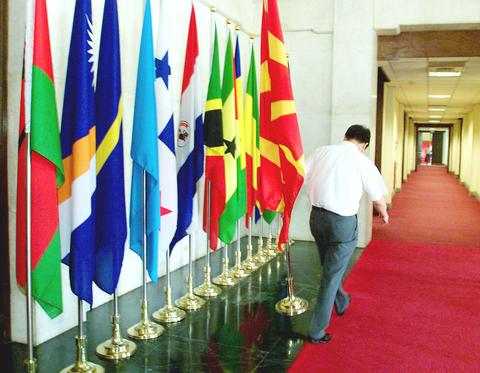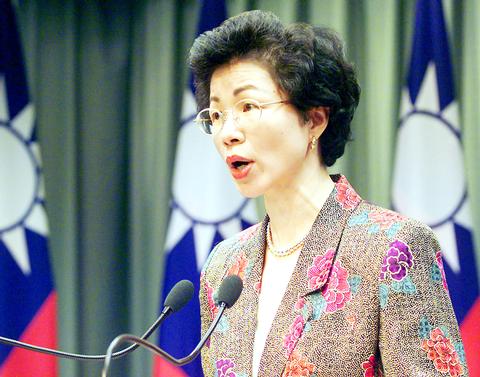Taiwan severed diplomatic ties with Macedonia yesterday and ended all economic aid to the crisis-torn Balkan state after its last-ditch effort to secure relations with the European country failed.
The end of diplomatic ties with Macedonia leaves Taiwan with 28 official diplomatic allies.

PHOTO: REUTERS
Spokeswoman for the Ministry of Foreign Affairs, Katharine Chang (張小月) made the announcement at a press conference yesterday morning. Chang noted that Macedonia wants the backing of Beijing -- a permanent member of the UN Security Council -- in its civil war and accused China of "coercing" the country into shifting recognition from Taipei to Beijing.

PHOTO: REUTERS
Chang said Taiwan "deeply regrets" that Macedonia has disregarded friendly ties between the two countries and "acquiesced to the pressure and enticement of China."
After Taiwan's announcement yesterday morning, China and Macedonia signed a joint communique in Beijing to normalize relations between the two countries, Beijing's official Xinhua news agency reported.
The statement was signed by Chinese Foreign Minister Tang Jiaxuan (
Chang said Taiwan would close its embassy in Macedonia immediately, terminate all agreements and cooperation projects between Taipei and Skopje and withdraw Taiwan's technical mission.
Chang stressed that Taiwan would not retain any "alternative" office in Skopje after breaking ties with Macedonia, saying "we will not have any representative offices there."
During Macedonia's Cabinet meeting last Tuesday, the Macedonian government decided to try to normalize its relations with China, Macedonian government spokesman Antonio Miloshoski told the Taipei Times last week.
Chang said the decision taken by Macedonia has not only seriously damaged the national interests of Taiwan, but also interrupted ongoing cooperation projects between the two countries totalling US$140 million.
"This is bound to hamper Macedonia's socio-economic development in the future," the foreign ministry statement said.
Chang's announcement came at 11am yesterday, shortly after the arrival of Macedonian Foreign Minister Ilinka Mitreva in Beijing, foreign ministry officials said.
Chang said the formation of the grand coalition government in Macedonia on May 13 spelled trouble for relations, since the new government integrated pro-China forces, thus hampering efforts of pro-Taiwan forces within the government.
Minister of Foreign Affairs Tien Hung-mao (
In view of the ethnic conflict in Macedonia that began in February and its rising anxiety over averting an imminent civil war, Macedonia has been keen on gaining China's international support in dealing with the five-month ethnic Albanian insurgency along its border with Kosovo.
China's status as a permanent member of the UN Security Council is seen as pivotal in helping Macedonia settle its domestic crisis.
Taiwan and Macedonia established diplomatic ties in January 1999 without notifying then Macedonian president Kiro Gligorov. Angered by the accord, China broke off ties with Macedonia the next month and vetoed the continuation of a UN peacekeeping mission in Macedonia in its capacity as one of the five permanent members of the UN Security Council.
Foreign ministry officials conceded that the loss of Macedonia as an ally was "a setback" for Taiwan, adding that in hindsight, changes in the the Balkan state's strategic situation made Skopje's shift of recognition from Taipei to Beijing inevitable.

CHAOS: Iranians took to the streets playing celebratory music after reports of Khamenei’s death on Saturday, while mourners also gathered in Tehran yesterday Iranian Supreme Leader Ayatollah Ali Khamenei was killed in a major attack on Iran launched by Israel and the US, throwing the future of the Islamic republic into doubt and raising the risk of regional instability. Iranian state television and the state-run IRNA news agency announced the 86-year-old’s death early yesterday. US President Donald Trump said it gave Iranians their “greatest chance” to “take back” their country. The announcements came after a joint US and Israeli aerial bombardment that targeted Iranian military and governmental sites. Trump said the “heavy and pinpoint bombing” would continue through the week or as long

TRUST: The KMT said it respected the US’ timing and considerations, and hoped it would continue to honor its commitments to helping Taiwan bolster its defenses and deterrence US President Donald Trump is delaying a multibillion-dollar arms sale to Taiwan to ensure his visit to Beijing is successful, a New York Times report said. The weapons sales package has stalled in the US Department of State, the report said, citing US officials it did not identify. The White House has told agencies not to push forward ahead of Trump’s meeting with Chinese President Xi Jinping (習近平), it said. The two last month held a phone call to discuss trade and geopolitical flashpoints ahead of the summit. Xi raised the Taiwan issue and urged the US to handle arms sales to

BIG SPENDERS: Foreign investors bought the most Taiwan equities since 2005, signaling confidence that an AI boom would continue to benefit chipmakers Taiwan Semiconductor Manufacturing Co’s (TSMC, 台積電) market capitalization swelled to US$2 trillion for the first time following a 4.25 percent rally in its American depositary receipts (ADR) overnight, putting the world’s biggest contract chipmaker sixth on the list of the world’s biggest companies by market capitalization, just behind Amazon.com Inc. The site CompaniesMarketcap.com ranked TSMC ahead of Saudi Aramco and Meta Platforms Inc. The Taiwanese company’s ADRs on Tuesday surged to US$385.75 on the New York Stock Exchange, as strong demand for artificial intelligence (AI) applications led to chip supply constraints and boost revenue growth to record-breaking levels. Each TSMC ADR represents

Pro-democracy media tycoon Jimmy Lai’s (黎智英) fraud conviction and prison sentence were yesterday overturned by a Hong Kong court, in a surprise legal decision that comes soon after Lai was jailed for 20 years on a separate national security charge. Judges Jeremy Poon (潘兆初), Anthea Pang (彭寶琴) and Derek Pang (彭偉昌) said in the judgement that they allowed the appeal from Lai, and another defendant in the case, to proceed, as a lower court judge had “erred.” “The Court of Appeal gave them leave to appeal against their conviction, allowed their appeals, quashed the convictions and set aside the sentences,” the judges